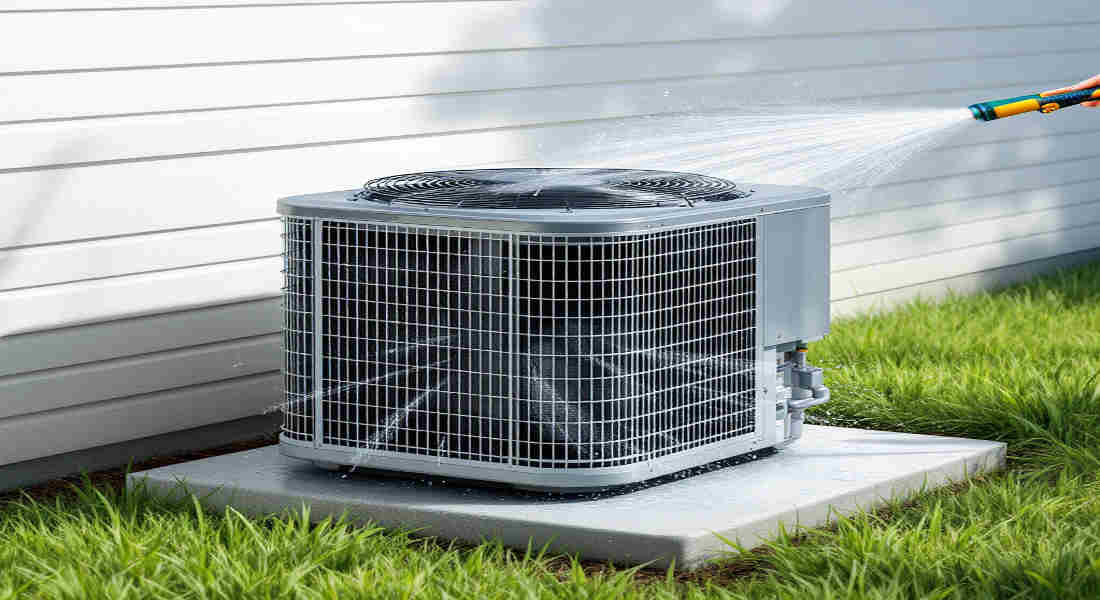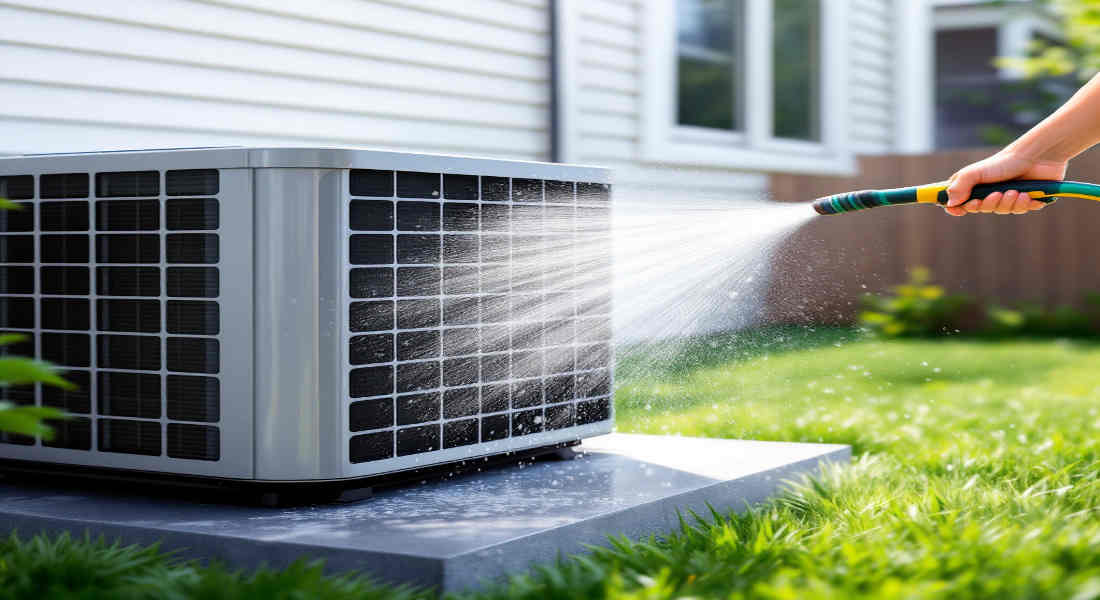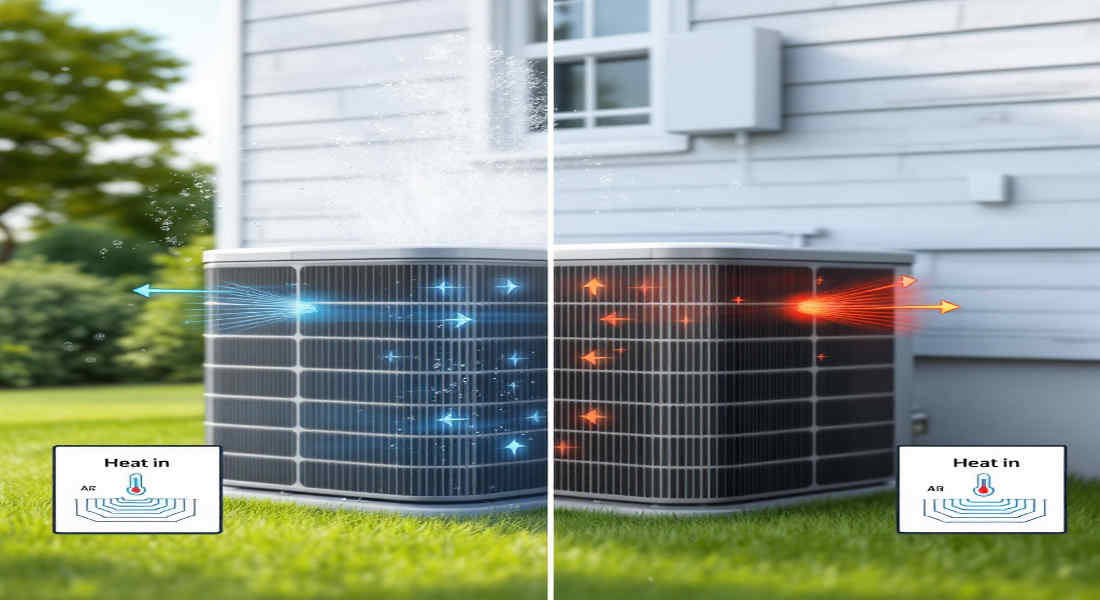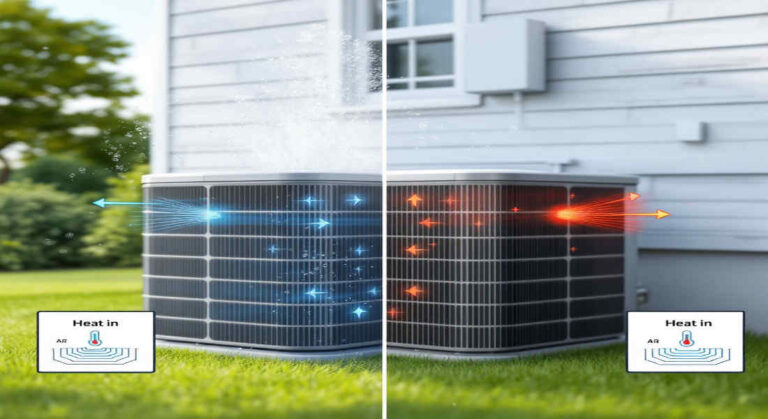When summer hits and temperatures soar, keeping your home cool becomes a top priority. Unfortunately, relying on air conditioning can often lead to high energy bills and a strained AC system. That’s why homeowners are constantly looking for ways to improve their AC’s efficiency without breaking the bank.
One method that’s gained attention is spraying water on the AC condenser. But does spraying your AC condenser with water really help cool your house? This guide is here to provide a clear answer.
Understanding Your AC Condenser and Its Role in Cooling
To understand why spraying your AC condenser with water may help, it’s important to know what the condenser is and how it works.
What Is an AC Condenser?
The AC condenser is a large, box-like unit typically located outside your home. It plays a crucial role in the air conditioning process. When your AC cools your house, it absorbs heat from the indoor air and transfers it outdoors. The condenser is responsible for releasing that heat into the surrounding environment.
How Does the AC Condenser Work?
Inside the condenser, a component called the condenser coil helps with heat exchange. Refrigerant, which absorbs heat from inside your home, flows through the coil. As the refrigerant passes through the condenser coil, the heat it carries is expelled into the outdoor air with the help of a fan.
This process is highly dependent on airflow and the coil’s ability to quickly release heat. If the condenser isn’t working efficiently—due to dirt, debris, or high outdoor temperatures—it can struggle to cool your home effectively.
Does Spraying the AC Condenser with Water Help Cool the House?
The short answer is yes; spraying water on your AC condenser can help improve cooling efficiency. Let’s explore why.
You may also read (how to make summer house doors).
The Science Behind It: Evaporative Cooling
Spraying water on the condenser coil introduces an evaporative cooling effect. When water evaporates, it absorbs heat from the surrounding surface. By wetting the condenser coil, you lower its temperature, helping the AC system release heat more efficiently.
How It Reduces the AC’s Workload
When the condenser coil stays cooler, the refrigerant inside can expel heat faster. This reduces the workload on your AC system, meaning it doesn’t have to work as hard to cool your home. As a result, your home cools down faster, and you may even see a reduction in energy consumption.
Expert Opinions
Experts in the HVAC industry generally agree that spraying water on the condenser can be beneficial in hot weather. However, they emphasize that it’s not a complete substitute for regular maintenance. Used correctly, this method can enhance your AC’s performance, but it should be part of a broader maintenance routine.
Benefits of Spraying Water on Your AC Condenser
Spraying your AC condenser with water offers several advantages that go beyond just cooling your house. Let’s break them down into detailed points.
You may also read (raccoons from my home).
Improves Cooling Efficiency
- Removing dirt, dust, and debris from the condenser coil improves airflow and heat dissipation.
- A clean condenser ensures that your AC can maintain a consistent indoor temperature, even on the hottest days.
Prevents Overheating
- Over time, dirt and grime can build up on the condenser coil, acting as insulation and trapping heat.
- Spraying water helps cool the coil and prevents overheating, which can lead to system shutdowns.
Reduces Energy Consumption
- When the condenser coil is clean and cool, the AC doesn’t need to use as much energy to expel heat.
- As a result, you may notice a lower electricity bill, especially during peak summer months.
Prolongs Lifespan of the AC Unit
- Dirt buildup and overheating put extra strain on your AC’s components, leading to wear and tear.
- Regularly spraying water on the condenser can prevent costly repairs and extend the unit’s lifespan.
BenefitHow It Helps
Improves Cooling Efficiency, Ensures consistent indoor temperatures, and better heat dissipation.
Prevents overheating and reduces the risk of system failures during high-demand periods.
Reduces Energy Use Lowers electricity bills by reducing the AC’s workload.
Extended Lifespan Minimizes wear and tear, preventing expensive breakdowns and replacements.
How to Properly Spray Your AC Condenser for Optimal Cooling
While spraying water on your AC condenser is effective, doing it incorrectly can cause problems. Follow these steps to ensure safety and efficiency.
Safety Precautions
- Turn off the power to your AC unit before spraying. This prevents electrical hazards.
- Avoid spraying water directly on electrical components like wiring or the motor.
Tools and Materials Needed
- A garden hose with a spray nozzle or a gentle water sprayer.
- A soft brush or cloth for cleaning stubborn dirt (optional).
Step-by-Step Guide
- Turn off the AC unit and disconnect the power for safety.
- Clear the area around the condenser of debris like leaves, grass, or dirt.
- Use a garden hose to spray water evenly over the condenser coils and fins. Avoid electrical components.
- Let the water evaporate naturally or gently wipe away excess moisture.
- Restore power to the unit and turn it back on to check its performance.
Frequency of Spraying and Maintenance Tips
- Spray the condenser monthly during hot seasons or whenever dirt buildup is noticeable.
- Combine DIY spraying with professional AC maintenance at least once a year for optimal performance.
Common Myths and Concerns About Spraying Water on AC Condensers
Myth: Water Damages the AC Unit
Some homeowners worry that water can damage the condenser. However, condenser coils are designed to handle water exposure. As long as you avoid electrical components, spraying water is perfectly safe.
Concern: Electrical Damage
To prevent electrical hazards, always turn off the power to the AC unit before spraying. Avoid spraying water directly on the wiring or the motor.
Concern: Corrosion Risk
Using clean water and avoiding harsh chemicals ensures that your condenser won’t corrode. Stick to plain water for the best results.
Additional Tips to Enhance AC Cooling Efficiency
Spraying water on the condenser is just one way to improve cooling. Here are a few additional tips:
- Keep the area around the condenser clear: Remove plants, debris, or obstructions that block airflow.
- Clean or replace air filters regularly: Dirty filters make your AC work harder.
- Shade the condenser unit: Use a canopy or shade cloth to reduce heat exposure without blocking airflow.
- Schedule annual inspections: Professional tune-ups can catch small issues before they become big problems.
When to Call a Professional
Sometimes, spraying water isn’t enough to resolve cooling issues. Here’s when to seek professional help:
- The AC unit is still overheating or not cooling effectively.
- You hear strange noises coming from the condenser.
- The system cycles on and off frequently, indicating a deeper issue.
A professional HVAC technician can provide deep cleaning and inspect for underlying problems that DIY methods can’t address.
You may also read (how to wire a generator to your home safely).

